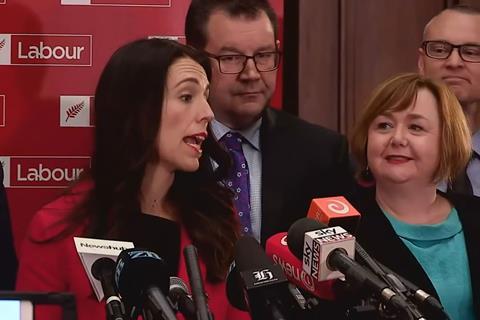Former New Zealand premier Jacinda Arden shines in this full-access documentary

Dirs: Michelle Walshe, Lindsay Utz. US. 2025. 102 mins.
When New Zealand politician Jacinda Ardern found herself propelled to the top of the Labour Party in 2017 with a general election just seven weeks away and the party’s poll ratings in a slump it’s unlikely she could have predicted what would follow. At just 37, she was about to become prime minister and discover that she was pregnant with her first child. American director Lindsay Utz and New Zealand-based documentarian Michelle Walshe have front row seats through the more than five years Ardern spent in office, while also giving a snapshot of her life afterwards.
Might just restore your faith in politicians
Offering an eye-opening insider perspective that comes as a reminder of what conviction politics looks like when it is maintained even under extreme pressure, as well as being a celebration of feminism, Prime Minister holds appeal for audiences well beyond New Zealand’s shores. Its presence in the World Cinema Documentary Competition at Sundance should launch it into the attention it deserves.
The bulk of the documentary mixes archive footage and backroom discussions with intimate video shot by Ardern’s partner, and now husband, Clarke Gayford within their home. Prime Minister also has access to recordings Ardern made for the country’s National Library’s Political Diary Oral History Project. It’s fluidly edited by Grace Zhrah and Enat Sidi, but Utz’s extensive work as an editor - she worked on Taylor Swift documentary Miss Americana and Oscar winner American Factory before making her directorial debut here - must also have been a boon given the amount of footage they accrued.
“We will remain relentlessly positive,” Ardern says early in the film and we see her practice what she preaches right through her time at the top. Her optimism is infectious and somehow all the more attractive since she freely admits to anxiety and imposter syndrome. Utz and Walshe weave together personal challenges, such as breastfeeding at work, with national crises as Ardern’s term continues so we are privy to the tensions she faces, often multiplied by harsh judgment of her as a woman.
Ardern’s ability to connect with people beyond mere soundbites is never more evident than in the wake of the 2019 Christchurch mosque terror attack, which killed 51 and injured dozens more. Moving footage shows her talking to the families who have lost loved ones as she advocates “telling people what you know even if it’s hard”.
At the time, Ardern famously vowed never to say the gunman’s name and the film follows suit, a smart choice that ensures the victims’ stories remain front and centre. Ardern’s emotional response to letters of thanks she receives is typical of her attitude in general, which is to be unafraid of showing how she feels. “People shouldn’t have to thank you for a humane response,” she insists. The film also details her practical attitude towards positive change, as she negotiates with her coalition partners in government to ban assault weapons and most semi-automatics in response.
Other crises caught by the cameras include a volcanic eruption and the advent of the Covid-19 pandemic, with Ardern insisting on stringent action in a bid to preserve life rather than “going full Churchill” like Boris Johnson. Darker moments come as anti-vaxxers start violent protests at the parliament, with the sense that they have been infected by conspiracy theories blooming elsewhere in the world.
The film’s more serious considerations are leavened by the footage shot by Gayford, in which the couple’s close bond shines out. “Are you fake carrying the laundry?” she asks him in one, while in others, he prompts honest responses to tough questions. Gayford, who is also one of the film’s producers, is a fairly constant background presence, often taking care of their young daughter Neve, so that the film also becomes a quiet celebration of spousal support and dedicated fuss-free fatherhood.
Ardern greatly admires Ernest Shackleton for the way he saved his crew after HMS Endurance became icebound in the Antarctic but it’s debatable as to whether the incorporation of archive footage of the ill-fated expedition adds much to a film that is best when it keeps its focus on its main subject. There’s also a little gloss given to her decision to step down, but it’s in keeping with a film that is as much about the person as the position she held. As Ardern moves to the United States, where she continues to be a fellow at Harvard, she keeps the faith with her principles, which are based on “compassion and empathy” - and she might just restore some of your own faith in politicians along the way.
Production companies: Madison Wells
International sales: CAA benjamin.kramer@caa.com
Producers: Cass Avery, Leon Kirkbeck, Gigi Pritzker, Rachel Shane, Katie Peck, Clarke Gayford
Cinematography: Thorsten Thielow, Clarke Gayford, Leon Kirkbeck
Editing: Grace Zahrah, Enat Sidi
Music: Sofia degli Alessandri
























